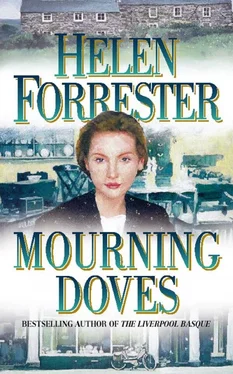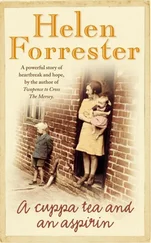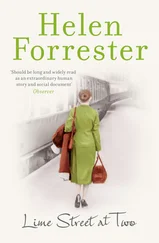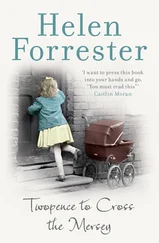1 ...8 9 10 12 13 14 ...19 ‘You should all start looking for new situations,’ Celia answered her frankly, though she did her best to hide her own sense of despair. ‘I know Mother will be glad to keep all of you on for a week or two, while we sort out the house, and decide what to take with us – we are going to live in a cottage in Meols, which Mother owns.’ She paused, and then said rather helplessly, ‘We have no choice but to sell this place quickly, Winnie. And we shan’t be able to afford servants.’ She looked up at the shocked elder woman. ‘I shall, personally, miss you terribly, Winnie, after all the years you’ve been with us, especially through the war.’
Winnie took a big breath, as she tried to control her own sense of panic. She inquired, ‘Things must be very bad, Miss?’
‘In a way they are, Winnie, though not as bad as they might be. Mother’s lucky that my Aunt Felicity left her this cottage by the sea.’ She sighed and fiddled with the fringe of the woollen shawl that Winnie had put across her legs to keep them warm. Then she said in explanation, ‘Father had heavy business debts. We can’t afford a servant – I’m hoping that we shall be able to have a daily cleaning woman – because I don’t think I shall be very good at keeping house!’
She smiled faintly at the stricken cook, who, despite her own sense of despair, noted that poor Miss Celia was taking it for granted that she would have to run the house – and she probably would have to. And she so small and sickly-looking.
‘How long do you think we’ve got, Miss?’
‘Well, I haven’t consulted Mother yet. Mr Albert Gilmore, who was here for the funeral, told us that the estate agent felt he would have no trouble selling this house. When it is sold, I suppose that we shall have to set a final date when we have to leave it – to suit the new owner. But we will have to let you go very soon.’ She looked up imploringly at her old friend, as if to ask forgiveness.
Winnie’s stout chest heaved, but she replied woodenly, ‘I understand, Miss.’
‘The other house has to have a few essential repairs done – and we have to get it cleaned – it’s filthy at present.’ She bit her lower lip, and then added quickly, ‘I think that Mother can pay you all for this week – and, I hope, for another week. Tomorrow I’ll talk to her, and we’ll try to make a timetable of some sort, to help you.’
‘It’s good of you to be so honest with me, Miss. Can I tell the others?’
‘Of course. There is so little time. You should all start looking for other situations immediately.’ She stopped to consider the appalling upheaval facing her, and then added heavily, ‘I’ll ask Mother to write references for you tomorrow – and if one of you wants to go for an interview on a day other than your half-day, will you arrange it as best you can between yourselves?’
‘We will, Miss. Thank you, Miss.’
Winnie bent and picked up the tray.
To Celia, her perceptions heightened by her own fears, the cook looked suddenly old as she turned slowly and went out of the room. She watched Winnie quietly close the door after her, and then she began to shake helplessly.
She clasped her arms tightly round her breast, and rolled herself over, so that her face was buried in the feather cushions which had propped her up. She began to sweat and her teeth chattered uncontrollably, as her fear of the scary world she was having to face and her sense of having betrayed an old friend overwhelmed her.
‘Oh, God,’ she whispered in desperation. ‘What’s going to happen to us? Heaven help us.’
She rolled again, to curl herself up in sheer terror into a tight foetal ball.
With what was left of her sanity she begged to die.
But she knew from experience of these attacks of panic that death did not oblige so easily. So in the unnatural silence of the home she was about to lose, she lay as still as she could, and prayed incoherently for release from the blind fear that engulfed her.
After a little while, her breathing became more normal, and she began to mutter very slowly, as she always did, ‘ “The Lord is my Shepherd; I shall not want.”’ She hoped that, if she could concentrate well enough to recite the psalm right through to the end and was comforted by King David’s immortal words, the seizure would ease.
It had always worked before when she was terrified, even when she was a child and had first realised that she was being brought up differently from her sister.
Because of her parents’ special interest in Edna’s well-being, she had always believed that their neglect of herself indicated that there must be something wrong with her. Had she some deficiency in her which they were hiding from her? Something weird which would one day spring out and send her mad – or, at least, make her a useless invalid, like a neighbour’s daughter who had been confined for years to a wheelchair by an attack of infantile paralysis?
This childhood dread, implanted by careless, selfish parents, had fed upon itself until, in her confused, early teenage years, it became an overwhelming terror, which periodically swept over her like some mighty wave whenever she felt threatened.
Frightened themselves by these seizures, her parents had firmly put them down to that popular female complaint, hysteria. It was the height of vulgarity, an effort to draw attention to herself, they said. They had slapped and beaten her at such times, then locked her in her bedroom, until she saw sense, as they put it.
The panic would eventually wear itself out, and, exhausted, she would drag herself out of her bed and knock on her bedroom door to plead tearfully to be let out. She invariably promised that it would not happen again, but, sooner or later, it invariably did.
Now, in adulthood, she had slowly realised that she was probably quite normal. But Church and custom reinforced her parents’ declaration that it was her duty as a good churchwoman and devoted daughter to care for them when they grew old. They had often made it clear to her that she was too stupid to be capable of doing anything else.
Sundry aged aunts and cousins at various times nodded their grey heads sadly over her and agreed that, since she was so plain and lacking in vivacity, she could not hope to marry. It was better she be the companion of her own dear mother than be faced with the horrors of having to earn a living at something dreadful, like being a companion-help in a strange household.
She had been devastated as it slowly dawned on her that she had simply been kept single and poorly educated for Timothy’s and Louise’s own convenience, not because they loved her and wanted to keep her by them. Her plaintive request during the war that, like many other women, she be allowed to nurse was met by a threat from Timothy to leave her penniless; nurses didn’t earn anything, he assured her. With two servants deserting the family in favour of working in ordnance factories, Timothy was not about to allow a useful daughter to desert as well. Such was the class distinction that it never once occurred to Celia that she could do precisely what the servants were doing – earn in a war factory.
Though hopelessly cowed by her parents, she carried under her subservience a terrible bitterness. This week it had been added to by the realisation that, at his death, her father had indeed left her nothing. She was now entirely dependent upon her mother’s whims.
Once she had understood that she was sane and not particularly unhealthy, she had not had a terror attack again. Like many other middle-class women, she sadly accepted that there was no escape from home. As a result of the war, marriage must now, in any case, be discounted – there were barely any men left for pretty girls to marry, never mind plain ones; they had died, like George and Tom, for the sake of their country; their names would be inscribed on one of the new war memorials going up all over a country which was already finding the wounded survivors an expensive nuisance.
Читать дальше












